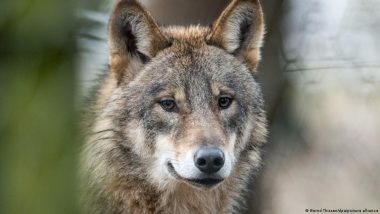European wolves are revitalizing wildlife and ecosystems. But in 2023 alone they killed several hundred livestock animals in Germany. The EU is considering to change wolf protection laws.Children are raised on stories about big bad wolves: how they prowl around forests, disguise themselves as sheep or grandmothers, and raze houses to eat little pigs living inside. We learn early that wolves are a menace in the dark, a symbol of savagery that lurks beyond the safety of urban society.
Also Read | NASA Scientists Spot Sun-Like Star Being Devoured by a Hungry Black Hole.
We learn to fear wolves, either through fables or experience. Our fear of wolves almost drove them to extinction in the 1800s. Once widespread in Europe, mass eradication policies decimated wolf populations.
Also Read | Chinese Scientists Grow World's First Human-Like Kidneys in Pigs.
Wolves made a comeback about a hundred years later.
Today, they're thriving — around 17,000 wolves live in mainland Europe and are steadily returning to their ancestral homelands.
Wolves: good for ecosystems but deadly for livestock
The science suggests that wolves are good for ecosystems as a whole. Studies in the US and Canada suggest that wolves have a restorative effect on ecosystems when they are reintroduced to their habitats.
But not everyone is happy about the wolves' return to Europe. Some reports suggest that wolves are increasingly encroaching on human civilization, attacking livestock and, on occasion, humans.
Farmers in Lower Saxony, Germany, have felt the worst of such wolf attacks. Between January and August 2023, more than 600 animals were killed there by wolves.
The attacks have led farmers to take matters into their own hands, often illegally hunting wolves.
EU under pressure to change wolf protection laws
Rising tensions have led the European Commission to step in, including its president, Ursula von der Leyen.
Von der Leyen has been at the centre of discussions around wolves since 2022, when a wolf killed her pony, Dolly. Von der Leyen put a kill order on the wolf, identified as GW950m, but it managed to avoid hunters and is thought to be at-large.
In a statement on September 4, 2023, Von der Leyen said:
"The concentration of wolf packs in some European regions has become a real danger for livestock and potentially also for humans. I urge local and national authorities to take action where necessary. Indeed, current EU legislation already enables them to do so."
The European Commission is now to decide whether to modify the protection of wolves within the EU, potentially allowing easier hunting rights.
Farmer and hunter lobby groups are pushing for a downgrade of wolf protection laws and less bureaucracy when they apply for permission to hunt wolves.
"There is a need for a faster and more efficient culling of wolves that repeatedly prey on grazers, as well as a reliable method for controlling wolf populations," said Joachim Rukwied, the President of the German Farmers' Association, in a statement in August.
Let us hunt wolves or traditional farming will vanish!
Rukwied said in the same statement that if politicians did not tackle the wolf issue, grazing in Germany would disappear. "Grazing cattle, sheep, goats and horses in the landscape would be a thing of the past," he said.
Conservationists, on the other hand, and animal protection groups, are urging the EU Commission to keep wolf protection laws as they are.
"Wolves are part of the evolutionary history of Europe's landscapes. We almost eradicated them once, so we need to protect their place in our ecosystems," Fabien Quétier, a conservation expert at Rewilding Europe, told DW.
The science says wolves help restore ecosystems
Quétier is concerned that moves to make it easier to hunt wolves would have a knock on effect on European wildlife.
In the 1990s, reintroduction of wolves to the Yellowstone National Park in the US helped restore river and forest ecosystems. The region had been plagued by erosion and defoliation due to rising deer and elk populations.
The wolves hunted the deer and elk and also changed their behavior patterns so that they avoided the valley and gorges Yellowstone National Park. As a result, wildlife began to regenerate, with plants, insect, bird, and mammalian species making their own comebacks. It even reduced river erosion.
There is evidence in Europe that reintroducing wolves has generated movement among prey, which decreases the pressure their prey has on crops or young trees.
"The bottom line is that wolves help maintain ecosystem balance," Quétier said.
Our fear of wolves: a return to the 1800s?
Wolf attacks on humans are extremely rare. A WWF report found that there were a total of 12 attacks in Europe and North America combined — over an 18 year period — from 2002 to 2020.
But Quétier is concerned that attitudes towards wolves are influenced by the same kind of fear people felt in the 1800s.
"There's a danger wolf eradication programs could start again. The effects of wolf hunting and poisoning would have horrible effects on the environment," said Quétier.
Attitudes to wolves grew more positive in the 1970s when wolves gained better legal protection so hunters were banned from shoot or poison them. All this was due to a cultural shift in how carnivores are viewed in the wild.
"There was a change in mindset about wolves that led to their protection. As the environmental crises has marched on, people's concerns for wildlife grew, and this is reflected in policies we have to protect wildlife," Quétier said.
The task for the European Commission now is to explore how best wolves and humans can live side-by-side, while minimizing the costs incurred on rural communities.
Edited by: Zulfikar Abbany
(The above story first appeared on LatestLY on Sep 08, 2023 04:50 PM IST. For more news and updates on politics, world, sports, entertainment and lifestyle, log on to our website latestly.com).













 Quickly
Quickly




















